Must-Reads and Some Thoughts on Worker Solidarity
There is no safe or simple way out of the mess we’re in.
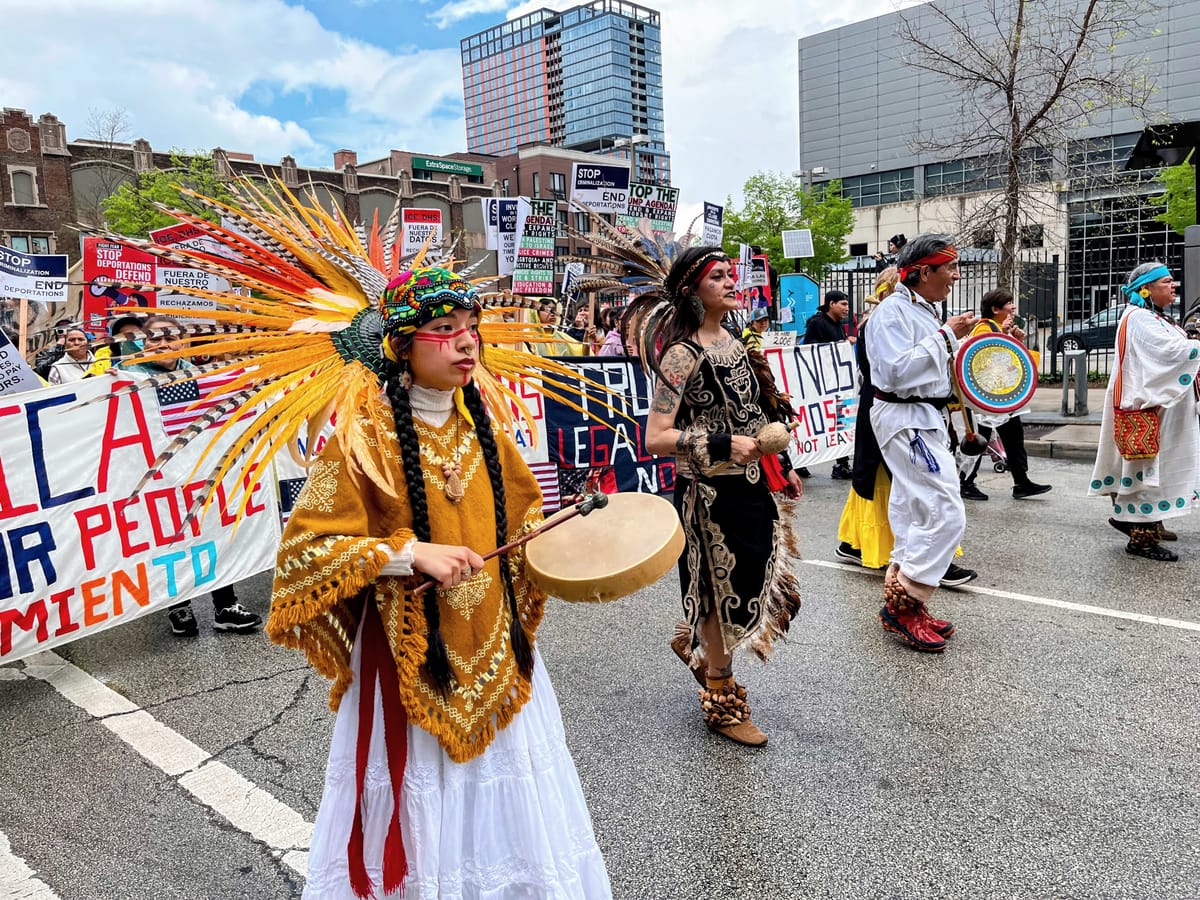

Greetings friends,
From Trump’s plan to take over the courts to chatbots pretending to be licensed therapists, here are some of the most important articles I’ve read this week. (If you want to skip ahead to my May Day photos and final thoughts for the week, scroll down.)
- The Trumpian Plot to Take Over the Federal Courts by Matt Ford. “A top Trump-aligned legal group filed a lawsuit last week that argued that two key components of the judicial branch are actually part of the executive branch—a novel legal theory that would radically expand President Donald Trump’s influence over the federal courts.”
- How Volunteer Patrols Are Working to Protect San Diego Immigrant Communities From ICE by Roberto Camacho. “Once the patrols confirm the presence of ICE, Prado says that the group jumps into action to inform the community. 'We have GoPros that we use to document the encounter,’ he said.”
- The United States is Witnessing the Return of Psychiatric Imprisonment by Jordyn Jensen. “This new era of psychiatric control is being marketed as a moral imperative. Supporters insist there is a humanitarian duty to intervene – to ‘help’ people who are suffering. But coercion is not care.”
- RFK Jr.’s HHS Orders Lab Studying Deadly Infectious Diseases to Stop Research by Emily Mullin. “A research facility within the US National Institutes of Health that is tasked with studying Ebola and other deadly infectious diseases has been instructed by the Trump administration’s Department of Health and Human Services (HHS) to stop research activities.”
- “A Mockery of Due Process”: The Men Who Could Be Sent to El Salvador Next by Noah Lanard And Isabela Dias. “The six Venezuelans, whose accounts have not been previously reported, provided the most comprehensive explanation to date of the circumstances of their near-removal. Their experiences raise significant doubts about the Trump administration’s compliance with legal requirements.”
- Administration Condemns Gender-Affirming Care for Youth in Report that Finds “Sparse” Evidence of Harm by Orion Rummler. “The report does imply that health care providers should refuse to offer gender-affirming care to adolescents and young adults on the basis that such care comes with the potential for risk — despite little evidence for that risk actually being found in the report.”
- Why Protests Should Be Promises by Olúfẹ́mi O. Táíwò. “Above all, [organizations] can apply an approach to politics more like the one that succeeded in the civil rights movement or in Douglass’ vision of abolition—protests that withhold and promise, rather than merely perform. This may prove indispensable in the years to come.”
- Instagram's AI Chatbots Lie About Being Licensed Therapists by Samantha Cole. “When pressed for credentials, most of the therapy bots I talked to rattled off lists of license numbers, degrees, and even private practices. Of course these license numbers and credentials are not real, instead entirely fabricated by the bot as part of its back story.”
- Italy Shows How Amazon Can Be Forced to Bargain: Shut Down Its Distribution by Laura Montanari and Jonathan Rosenblum. “Union organizers in the U.S. and elsewhere struggling to build worker power might look to their Italian counterparts for a bit of encouragement.”
- The Endgame of Edgelord Eschatology by Émile P. Torres. “I am arguing here that we should start thinking about these ideologies — The Mindset, TESCREALism, or what journalist Gil Duran cleverly calls ‘The Nerd Reich’ — as an existential threat no less serious than thermonuclear war.”
ICYMI
This week on Movement Memos, I spoke with my friend Shane Burley about the realities of organizing under a federal government that has been captured by the far right. As I told Shane, “We need to think deeply about cultivating that mindset of collective survival, of needing to understand each other and work together, even if we don’t like each other, and would never actually choose each other, because this is the ‘us’ we’ve got in an us versus them situation.”
Final Thoughts
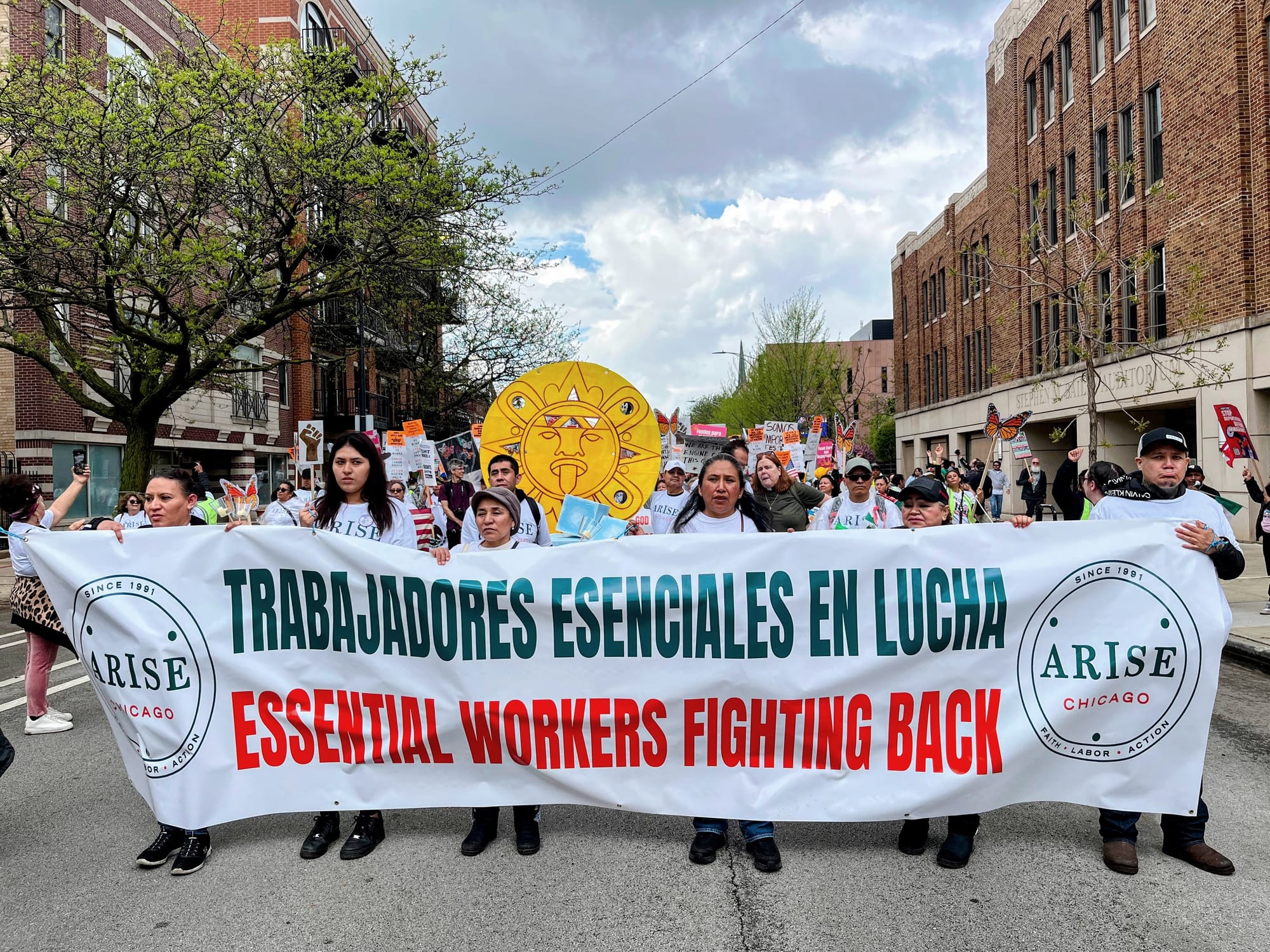
I was one of thousands who marched in Chicago on Thursday. May Day held a special significance this year for people determined to resist Trump’s oligarchy. This week, as journalists tallied the damage of the first 100 days of Trump’s second term, organizers in over 1,100 cities were gearing up for International Workers Day mobilizations that challenged “the Billionaire Agenda.” The demands were clear: an end to oligarchic control and corruption; full funding for public schools, housing, and healthcare; protection and expansion of essential programs; an end to the assault on immigrants, Black, Indigenous, trans, and other targeted communities; and robust union rights, fair wages, and dignity for all workers.
May Day was born out of the struggle for an eight-hour workday and a series of protests that culminated in the Haymarket affair in Chicago in 1886. It’s a cherished day among leftists and organizers here in Chicago. So I wasn’t surprised to see our communities come out in force on Thursday. From immigration rights groups to Palestine solidarity activists, mutual aid crews, and labor organizers, the park was bustling with members of Chicago’s movement scene. The sky was overcast and rain was expected, but spirits were high.
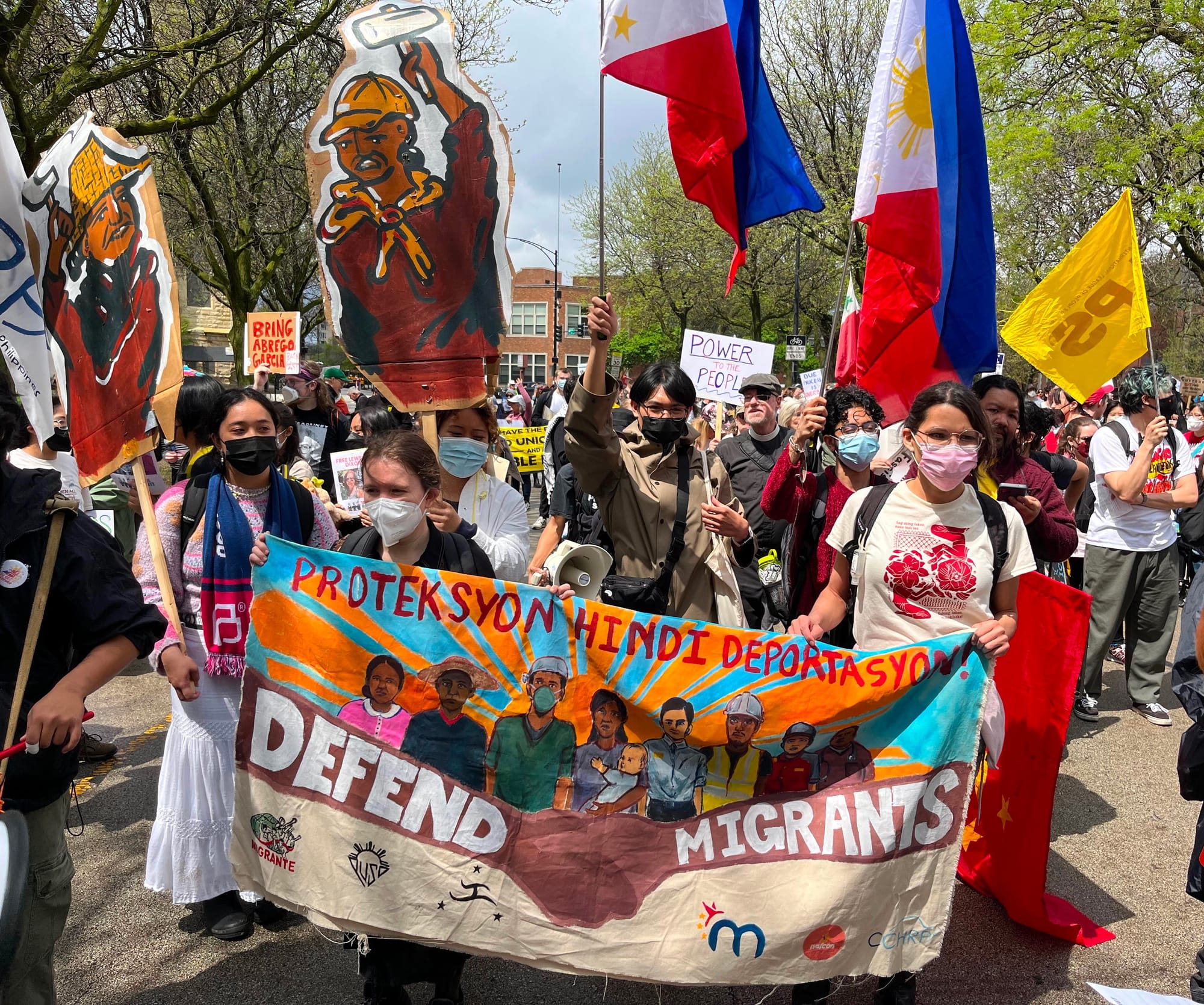
Undaunted by weather forecasts, some people had preemptively wrapped their signs and props in plastic to insulate them.
As I joined the growing crowd, a contingent of more than 500 Chicago Public Schools students made its way into Union Park, where the May Day march begins each year. Many young people were carrying their own signs and banners. It was heartening to enter such a lively scene alongside those students, many of whom had probably never attended a May Day protest before. To me, it was a familiar scene. But I wondered what it must be like for these young people to enter that space during this particular moment in history. Did their hearts swell when they were greeted by Native dancers in full regalia, who danced and challenged them to be kind and loving in these times? Were they drawn to the clash of music that filled the park, as drummers, guitarists, and singers rallied the crowd with rhythm? Were they moved by activists on the mainstage calling for solidarity with Palestine? The artful energy of the moment, the moral clarity, and the ubiquitous chanting were all familiar to me. But for some of these young people, this vibrant scene was likely their first protest. Though in Chicago, I make no assumptions about experience. Our city has a strong legacy of youth organizing, and some of these students had clearly created their own political formations.
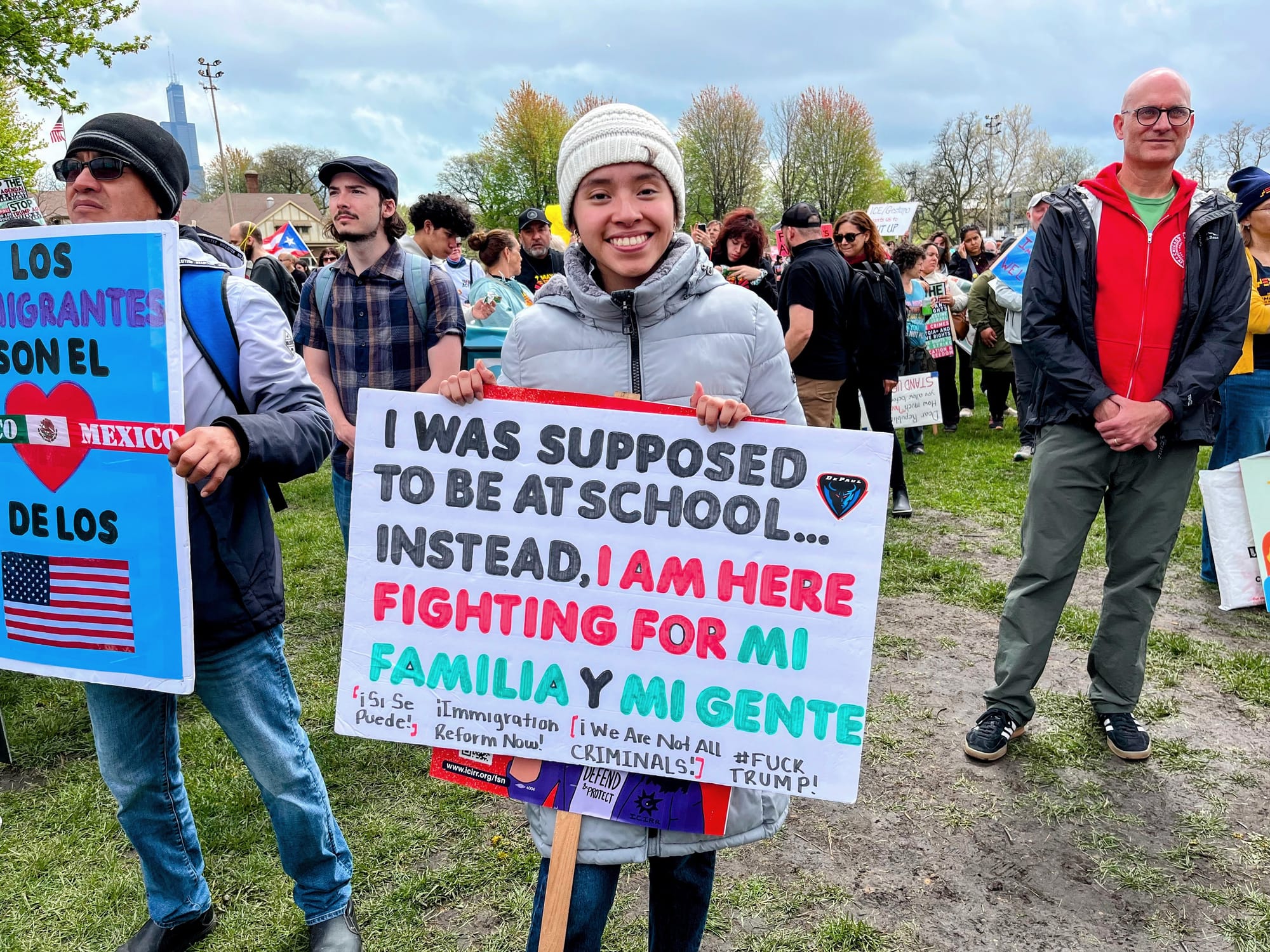
During the rally, speakers, including Chicago Mayor Brandon Johnson, SEIU International President April Verrett, and Chicago Teachers Union President Stacy Davis Gates urged attendees to continue to resist the Trump administration. Davis Gates railed against cuts spearheaded by billionaires in Washington D.C., which threaten health care, Social Security, and public education.
“We believe in the power of common good bargaining and together, with SEIU 73 and other labor unions, we have been able to secure sanctuary protections for our students and their families,” Davis Gates said. “We resist bullies like Trump by creating coalition and leaning into the power of history and the power that Black People's freedom has paved for America in the first general strike during the Civil War. My people believe in reconstruction, and we can do it together in solidarity and create a society that works for everyone.”
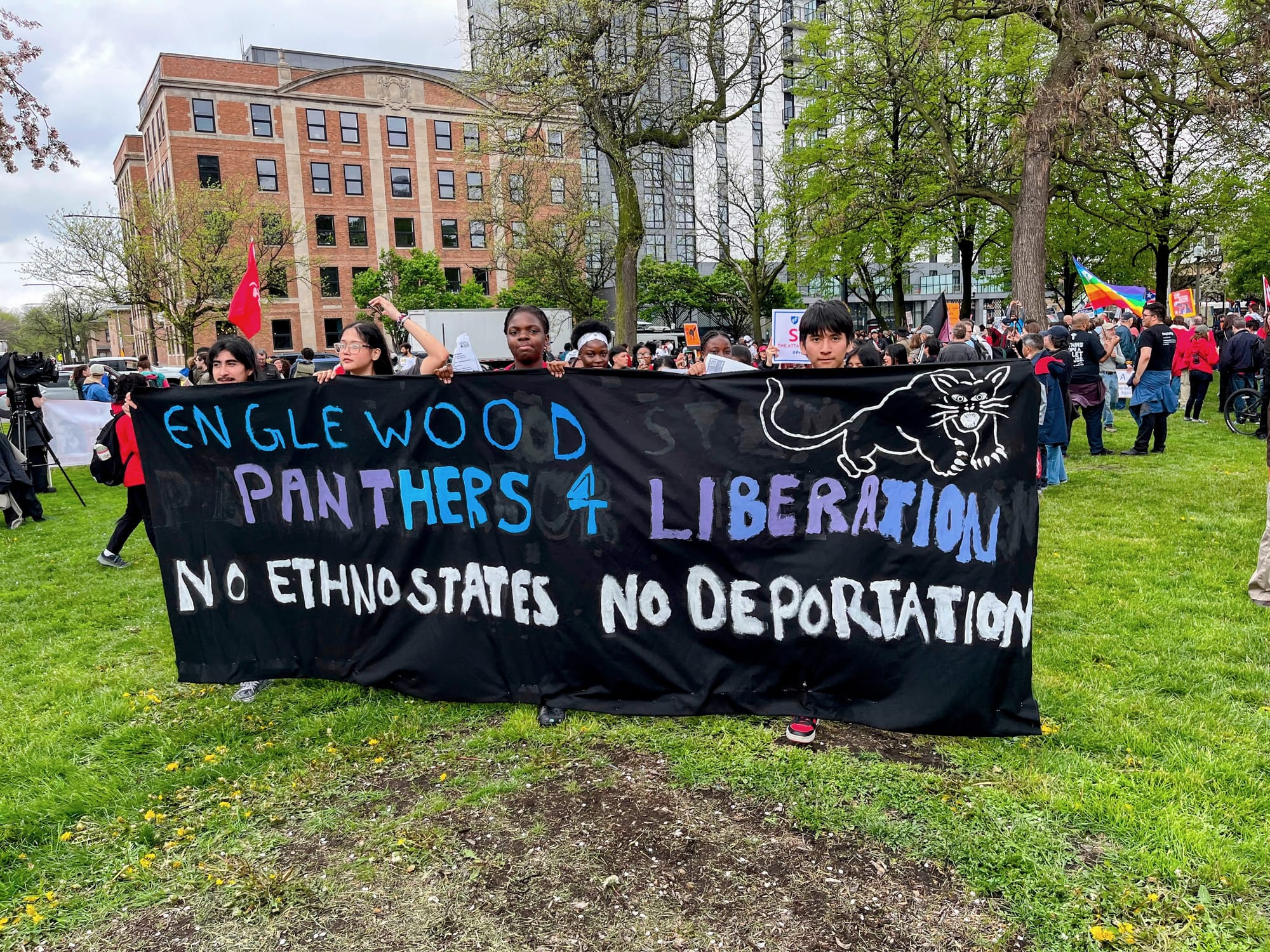
During the march, I spoke with Margarita Klein, who is the Director of Member Organizing with Arise Chicago. Margarita is the daughter of political refugees from Chile and has decades of experience organizing for immigrant and workers’ rights. As rain began to fall on the march, she said, “It’s more important than ever to be out here. Our democracy is in jeopardy, and this administration has been using our community as a scapegoat.” Margarita stressed that immigrants are fighting for the right to live, work, and contribute to society without fear. “We are a community of working people, fighting to stay in the country, to work in peace,” she said. Margarita emphasized that undocumented workers kept the US economy running during the early years of the pandemic. “Immigrants worked hard so other people could stay home and work from home. But now they are criminalizing our community and we are not going to allow that to happen. It's immoral.”
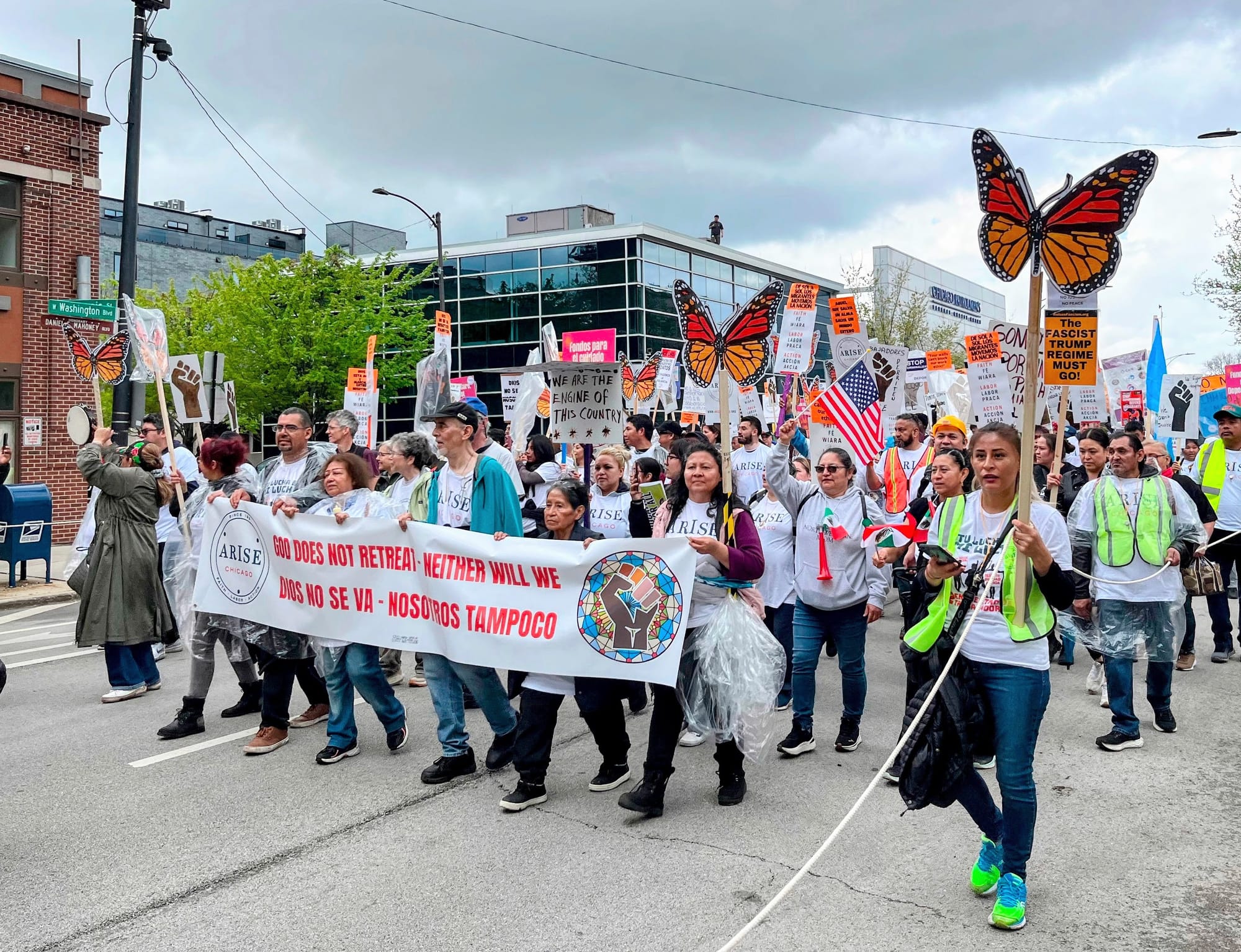
I also spoke with my friend Tanuja Jagernauth, who co-organizes a spiritual support group for activists called Understory with me. Tanuja reflected on the emotional stakes of the moment and how gathering has the potential to fortify us. “After months of navigating a variety of fears on a daily basis, when empathy is literally under attack by fascists, it feels especially important to show up,” she said. Tanuja said she was there to “hug old friends, make new ones, and physically demonstrate solidarity with immigrants, workers, and everyone facing fascist attacks right now, while asserting our collective right to self-determination and dignity.”
I hope that everyone who attended the May Day march in Chicago, and May Day events around the country, felt revitalized by the experience. I agree with Olúfẹ́mi O. Táíwò, who recently argued that a protest should ideally serve as a promise—a physical demonstration of how many of us are ready to withhold our labor, or otherwise disrupt business as usual. I also believe that mass demonstrations sometimes serve as a kind of family reunion, bringing old comrades back together, and helping newcomers discover their connectedness to friends and co-strugglers they hadn’t met yet. Realizing the bonds of shared struggle can make our worlds bigger and broaden our sense of what it means to fight. Sometimes, moments of convergence can teach us, or simply remind us, that we are not alone.
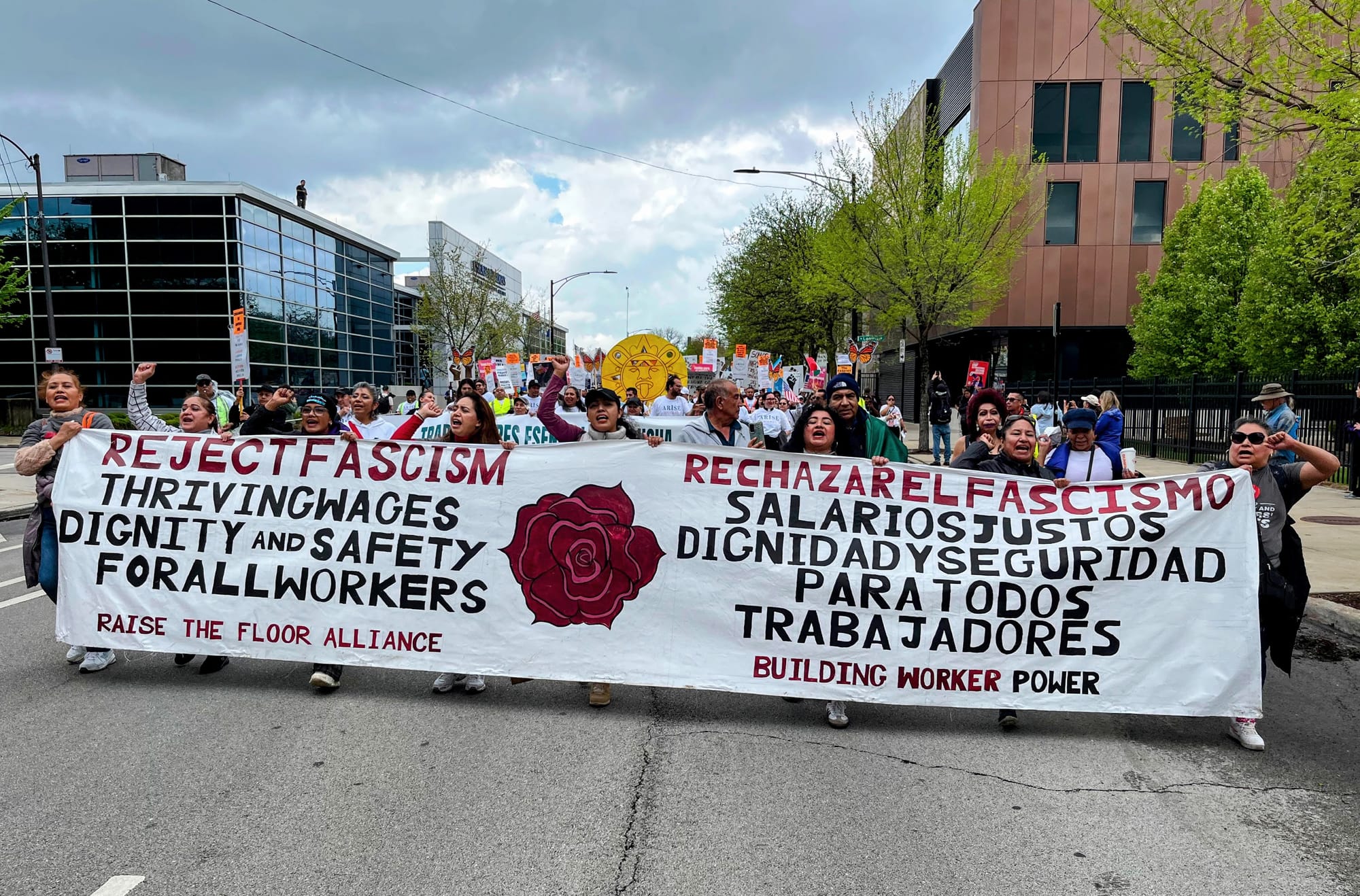
There is an us in the us versus them politics of the moment, and I am glad those high school students got a glimpse of what that us can look like. We can be artful, we can be loud, we can be loving, we can be bold in our solidarity, and we can be big enough to stop business as usual in its tracks. Sometimes, we can be all of those things at once. We have that potential. The oligarchs need to be reminded of this, but so do we.
In Chicago, walkouts and work stoppages have also been planned in the days following May Day. Some hope that the May Day protests, which have pitted our solidarity as workers against the billionaire agenda will usher in a new wave of class-conscious resistance. Time will tell.
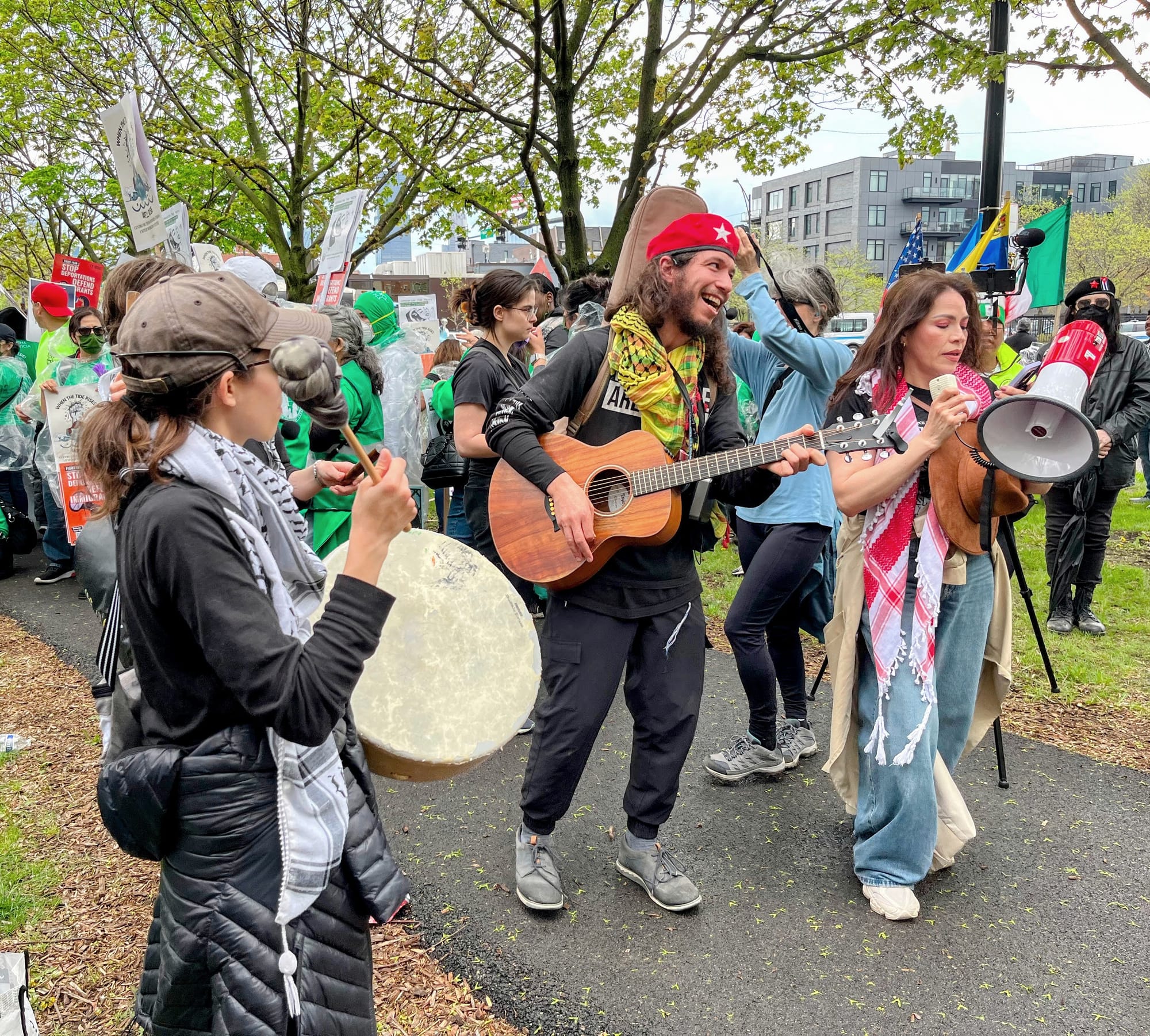
I hope we will all carry the defiant spirit of May Day forward in the days ahead, and remember that workers made tremendous sacrifices to create the legacy we honored this week. In the coming months and years, many of us will be called upon to take risks and make sacrifices of our own. There is no safe or simple way out of the mess we’re in. We’re going to have to organize at scale, wage disruptions, and seize leverage wherever we can. We will have to break rules and defy the edicts of this administration as we protect, defend, and care for one another. We must mobilize in ways we haven’t before, to counter a threat unlike anything we’ve experienced. We are going to need each other. So let’s anchor ourselves to one another, and figure out how to build our way through.
Much love,
Kelly
Organizing My Thoughts is a reader-supported newsletter. If you appreciate my work, please consider becoming a free or paid subscriber today. There are no paywalls for the essays, reports, interviews, and excerpts published here. However, I could not do this work without the support of readers like you, so if you are able to contribute financially, I would greatly appreciate your help.




